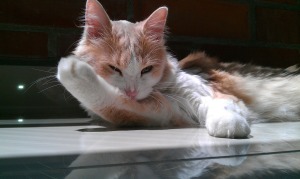Too Much of a Good Thing: Obsessive Grooming in Cats
Did you know that cats can spend between 30% and 50% of the day grooming? Cats are famously fastidious about keeping their fur clean, and it’s normal to see a cat routinely grooming herself. But how do you know if your cat is licking her fur too much, or if the licking is turning into chewing or pulling? Cats that engage in excessive grooming will often have so-called “mowed” spots or strips where their fur is missing. Obsessive grooming can have either physical or emotional causes. Here is quick overview of the most common reasons for excessive licking in cats, and what you can do about it.
Physical causes:
Parasites: Parasites such as fleas, ticks, lice, mites and ringworm can cause excessive licking, often on the lower back area.
Allergies: Allergic reactions to food, pollen or other environmental elements can cause your cat to lick too much. Cats with allergies can experience dry, itchy skin, especially on the back and abdomen. Dry skin unrelated to allergies can be caused by low humidity or nutritional problems, and also lead to excessive grooming.
Pain: If the grooming is localized to a small area, you cat could be experiencing pain from such causes as disc disease or impacted anal sacs in males.
See your vet about possible parasites. There are many treatments available to solve parasite problems. You can also consult with your vet about possible food allergies. Nutritional supplements can be added to the diet for dry skin not caused by allergies.
Emotional causes:
Stress and anxiety: Like nail biting in humans, cats can engage in compulsive grooming behaviors when stressed. Stressors can include changes in the home environment such as a move or the introduction of a new pet.
Boredom: Bored cats that don’t get enough stimulation, play or interaction can also engage in excessive licking.
If your cat is anxious, seek out ways to relieve her stress and make her feel more secure. This could be as simple as proving her with a safe place to retreat when she feels scared, or spending a little extra time giving her one on one attention. Anti-anxiety medicine can be prescribed in extreme cases.
Bored cats can benefit from increased play and exercise, and even the addition of another pet if your cat is alone most of the day.

